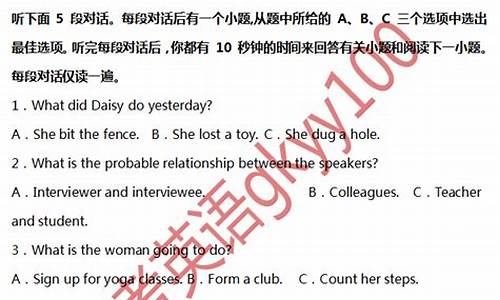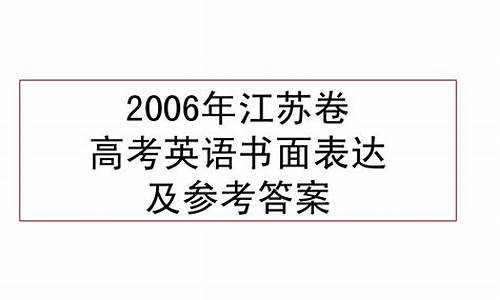您现在的位置是: 首页 > 教育分析 教育分析
2017英语高考答案全国三卷,2017高考英语押题3
tamoadmin 2024-05-19 人已围观
简介《高中英语语法-高三英语知识点综合训练3》由liuxue86.com我整理。本内容整理时间为05月12日,如有任何问题请联系我们。 高三英语知识点综合训练3 高考综合复习:Book 1 Unit 4---6 重点词汇与短语: 1.take place 发生 2.so---that 如此---以致于 3.sweep sb. down 冲倒 4.pull up 拽起,停车 5.ho

《高中英语语法-高三英语知识点综合训练3》由liuxue86.com我整理。本内容整理时间为05月12日,如有任何问题请联系我们。
高三英语知识点综合训练3
高考综合复习:Book 1 Unit 4---6
重点词汇与短语:
1.take place 发生
2.so---that 如此---以致于
3.sweep sb. down 冲倒
4.pull up 拽起,停车
5.hold on to 抓住,握住
6.get on one?s feet 站起来
7.go on a holiday 度假
8.far away from 远离
9.on fire 着火
10.such as 例如
11.travel agent 旅行社
12.be caught in 遭遇到
13.think twice 三思
14.think highly of 对---评价很高
15.stare at 盯着
16.leave out遗漏
17.take off 脱下,起飞
18.go wrong 出问题
19.in all 总之
20.on the air 广播
21.make jokes about开---的玩笑
22.play a role扮演角色
23.make money 挣钱
24.owe success to sb.把成功归功于某人
25.start with 以---开始
26.a thank-you letter 一封感谢信
27.introduce---to--- 将---介绍给---
28.make a good impression 留下好印象
29.the custom of toasting 敬酒的习俗
30.apologize to sb. for sth.因为某事向某人道歉
交际用语:
1.Well done! 做得好!
2.You can do it! 你能行!
3.Come on! 快点!
4.It scares me. 这让我害怕。
5.Keep trying! 再试试!
6.How do you like/find---? 你认为---怎么样?
7.What do you think of---? 你认为---怎么样?
8.Excuse me. 对不起。
9.Forgive me. 请原谅。
10.I?m (very/so/terribly) sorry. 十分抱歉。
11.I?m sorry. I didn?t mean to---. 对不起,我不是有意---。
12.That?s all right./ That?s OK./ No problem. 没关系。
知识点归纳:
1.advance
(1) v. 前进,推进,促进,提升
Napoleon?s army advanced towards Moscow. 那破仑的军队向莫斯科挺进了。
Two months has passed and the project has advanced.
两个月过去了,这项工程已有进展。
(2) n. 前进,进展
The commander ordered to halt the enemy?s advance. 司令下令阻止敌军前进。
He?s always paying attention to the advances in medical science.
他时刻注意着医学上的进步。
(3)in advance 预先,在---之前
I was given a month?s salary in advance. 我提前发了一个月的工资。
(4)advancedadj. 高级的,先进的
Einstein learned advanced mathematics all by himself at 13.
爱因斯坦13岁就能自学高等数学了。
Few scientists could understand his advanced theory at that time.
那时没几个科学家能理解他高深的理论。
2.seize vt.
(1) 抓住,捉住
The thief was seized by the police. 那个小偷被警察抓住了。
He seized me by the arm. 他抓住了我的胳膊。
(2) 抓住(时机)
If you get the opportunity to work abroad, you should seize it with both hands.
如果你有出国工作的机会,切勿放过。
Seize the day, seize the hour!
只争朝夕!
(3)(思想、感情等)支配人的头脑
The man was seized with panic. 这个人惊慌失措。
Uncontrollable laughter seized us. 我们不由自主地大笑起来了。
3.strike vt. vi. (struck, struck/stricken)
(1) 打,击,砍,敲
strike a blow 击出一拳
strike a match 划火柴
I wouldn?t dream of striking a woman. 我做梦也不会打女人。
He was so angry that he struck the table with his fist. 他气得用拳头砸桌子。
(2) 打中,击中;撞,触礁
A snow ball struck/hit him on the back of the head. 一个雪球打中了他的后脑勺。
Then my shovel struck against something metallic.
然后我的铲子碰到了一件像金属的东西。
(3)(某种想法)忽然出现;使(某人)突然意识到
It strikes sb. that--- 忽然意识到
be struck by--- 深受感动
The funny side of the affair suddenly struck her. 她突然意识到了事情可笑的一面。
We were struck by the generosity of even the poorest citizens.
使我们深受感动的是,甚至最贫穷的市民也慷慨大方。
(4) 给某人某种印象
---How did it strike you? 你觉得它如何?
---It struck me as strange at the time. 我当时觉得它很古怪。
(5)(钟)敲响
The church clock began to strike twelve. 教堂的钟开始敲12点。
(6) 突然袭击
When the snake strikes, its mouth opens wide.
蛇发起进攻时,嘴张得很大。
I fear an earthquake will strike this area again. 我担心地震会再次发生在这一地区。
(7) 罢工 (也可用做名词)
I?m sure the bus drivers will strike/ go on strike. 我确信公共汽车司机会罢工。
(8) strike, beat, hit, tap, knock
strike 常表示用力打或敲
hit有?撞击,袭击?之意,比strike稍弱一些,指一次性的打击或击中
beat 指连续多次的打,也指有节奏的击打,还可表示打败
tap指轻拍
knock 指敲打并伴有响声,还可表示打倒、撞翻
考题链接:
(1) It _____ her how quiet and gentle he was.
A. beat B. hit C. struck D. knock
(2) He sat quietly in the room, listening to the rain ____ against the window.
A. beating B. hitting C. striking D. knocking
答案 C A
分析 第一题表示?使某人忽然意识到?,用strike; 第二题表示连续敲打,用beat.
4.感官动词 see, hear, find, notice, watch + 宾语 +宾补
(1) 感官动词 + 宾语 +doing, 表示宾补的动作正在发生。
We can see parrots flying along the river. 我们可以看到鹦鹉在沿着河边飞翔。
I can feel my heart beating fast. 我可以感觉到我的心跳得很快。
(2) 感官动词 + 宾语 +do, 表示宾补的动作已经完成。
I saw him cross the street. 我看见他过了马路。
I didn?t notice you enter. 我没注意你进来了。
(3) 感官动词 + 宾语 +done, 表示宾语和宾补之间是被动关系。
I found his hands tied to a tree. 我发现他的双手被绑在树上。
He saw the girl bitten by the dog. 他看到那个女孩被狗咬了。
5.fight
(1) vt. 和---作战
We are fighting pollution now. 我们正在和污染作斗争。
(2) vi.
fight against 为反对---而斗争
The slaves fought against the slavery. 奴隶们为推翻奴隶制度而战。
fight for 为(争取)---而斗争
He called on the slaves to fight for freedom. 他号召奴隶们为自由而战。
fight with 同---一起战斗,与---战斗
France fought with Germany in that war. 在那场战争中法国对德国作战。
fight over 因为---而争吵
The twin sisters always fight over toys. 这对双胞胎姐妹经常因为玩具而争吵。
(3) n. 战斗,搏斗
This film is about people?s fight for right. 这部**反映了人民争取自己权利的斗争。
Our country has started a fight against corruption. 我国已经开始了一场反腐败斗争。
(4) fight, war, battle, struggle
fight 意为?战争?,指战争的动作。
They fought back in self-defence. 他们进行了自卫还击。
war 指全面战争,包含多次。
We experienced two world wars in the last century.
上个世纪我们经历了两次世界大战。
battle 战役,指大的、连续数小时数天的战争。
the battle of Waterloo 滑铁卢战役
struggle 指较长时间的激烈的争斗,常指肉体、精神上的战斗。
They had to struggle for their freedom. 他们不得不为自由而战。
The army struggled against Japanese Imperialist. 这部队与日本帝国主义作斗争。
6.take place, happen, break out
take place 多表示按计划或规定要发生的事情。
happen 常用词,有偶然发生之意。
break out 常指战争、火灾和疾病的爆发。
三个词组都为不及物动词,没有被动语态。
A fire broke out in his house last night. 昨晚他家里失火了。
He was in French when the Second World War broke out. 二战爆发时他在法国。
When did the traffic accident happen?交通事故是什么时候发生的?
Something strange has happened to the chemistry teacher. 化学老师出了点奇怪的事情。
When will the sports meet take place? 运动会什么时候举行?
Great changes have taken place in his hometown since 1980.
从1980年以来他的家乡发生了巨变。
7.destroy vt.破坏,毁灭,毁掉
The school was completely destroyed by fire. 学校被大火彻底烧毁了。
That accident destroyed her ballet career. 那次事故毁掉了她的芭蕾生涯。
destroy表示彻底毁掉,也可用于抽象意义,可指人或物。
damage 通常指车辆、房屋、庄稼等无生命物体受到损伤或毁坏,但往往可以修复。可用作名词。
ruin 表示毁坏某种好的或有用的东西。
The chemical rain damages trees in the forests. 酸雨损害了森林中的树木。
The precious painting was ruined by spilt milk. 洒出来的牛奶毁坏了那幅珍贵的画。
The storm caused great damage to the crops. 这场风暴给庄稼造成了很大的损害。
8.award
(1) 可数名词,主要指?奖品,奖赏,奖金?,有时也指?报酬,工资?。
Meryl Streep won the best actress award. 梅丽尔斯特里普获最佳女演员奖。
The Olympic winner received a gold medal as an award. 奥运会冠军的奖品是一枚金牌。
The nurses? pay award was not as much as they had expected.
护士的工资远没有她们预想的那么多。
(2) vt. 给予,授予,判给
Einstein was awarded the Nobel Prize for his work in quantum physics.
爱因斯坦因在量子物理学方面的成就而被授予诺贝尔奖。
The university awarded her a scholarship. 那所大学给她发了奖学金。
(3) priz 主要用于表示?获得几等奖?或?获奖金额?,常说
win a prize for---
award sb. a prize
reward 可用做名词或动词,指?报答,报偿,奖赏?。
考题链接:
It is widely accepted that young babies learn to do things because certain acts lead to ____.
A. rewards B. prizes C. awards D. results
答案 A
分析 该句意思为?人们普遍认为小孩子学会做事是因为这些行为会带来奖赏/回报?。
9.owe vt.
(1)欠(债)
If he has borrowed some money from her, and has not paid her back, he owes her the money.
如果他借了她的钱没归还,他就欠她钱。
How much do I owe you? 我欠你多少钱?
We owe our parents a lot. 我们对父母感激不尽。
(2) owe sth. to sb. 感激,把---归功于---
He owes his success to our help. 他把成功归功于我们的帮助。
We owe a great deal to our parents and teachers. 我们深受父母及师长之恩。
I owe it to you that I am still alive. 我现在还活着,应该感激你。
(3) owing to由于,因为
Owing to the rain they could not come. 因为下雨,他们不能来。
Owing to the drought, crops are short. 因为天旱,收成不好。
10.live adj. 活的,生动的,精力充沛的,实况转播的
It wasn?t a recorded show; it was live. 这不是录像,是实况转播。
They gave live broadcast while the performances were in process on the stage.
当演出在舞台上进行时他们进行了实况转播。
The concert will be broadcast live. 这次演唱会将进行实况转播。
That is a live fish. 那是一条活鱼。
The laboratory is conducting experiments with a dozen live monkeys.
该实验室在用十多只活猴子进行实验。
She is a live woman. 她是一位精力充沛的女人。
live 当?活的?讲时,只修饰动物,如a live mouse, a live snake
11.take off
(1) 脱掉,摘掉(反义词为put on)
I forgot to take off my make-up last night. 我昨天晚上忘了卸妆。
He took off his coat and went to sleep. 他脱下外衣睡觉了。
(2) (飞机)起飞,起跑
As the plane was taking off, I remembered I didn?t turn the iron off.
飞机起飞时,我才想起我没有切断熨斗的电源。
When we went to the airport, the plane had taken off. 我们到机场时,飞机已经起飞了。
(3) 休假,一般说take some time off
I?m taking Thursday off to do some Christmas shopping.
我周四要休假去买一些圣诞礼物。
(4) 开始成功,成名
I hear the business is really taking off. 我听说生意真的开始兴隆了。
Spielberg?s career really took off when he began to shoot his short films.
斯皮尔伯格开始从事短片拍摄时,他的事业真正腾飞了。
(5) take in 吸收,理解;收留
take back 使回忆起;追回
take over 接管,接任
take up 开始从事;占去(时间、空间);拿起(武器)
高考链接:
(1)It is certain that he will ______ his business to his son when he gets old. (福建2004)
A. take over B. think over C. hand over D. go over
(2)Helen always helps her mother even though going to school ______ most of her day.
(广东2004)
A. takes up B. makes up C. saves up D. puts up
答案
(1) C hand sth. over to sb. ?把---传给某人?
(2) A take up ?占用时间? 《高中英语语法-高三英语知识点综合训练3》由liuxue86.com我整理
阅读是外语学习者获取语言知识和提高语言能力的主要途径,阅读理 解能力是衡量学习者外语水平的重要指标。一起做一下阅读理解训练吧。下面是我为大家推荐的2017高考英语真题阅读理解总结,仅供大家参考!
2017高考英语真题阅读理解总结一
I found out one time that doing a favor for someone could get you into a lot of trouble. I was in the eighth grade at the time, and we were having a final test. During the test, the girl sitting next to me whispered something, but I didn?t understand. So I leaned over her way and found out that she was trying to ask me if I had an extra pen. She showed me that hers was out of ink and would not write. I happened to have an extra one, so I took it out of my pocket and put it on her desk.
Later, after the test papers had been turned in, the teacher asked me to stay in the room when all the other students were dismissed. As soon as we were alone she began to talk to me about what it meant to grow up; she talked about how important it was to stand on your own two feet and be responsible (负责任) for your own acts. For a long time, she talked about honesty and emphasized the fact that when people do something dishonest, they are really cheating themselves. She made me promise that I would think seriously about all the things she had said, and then she told me I could leave. I walked out of the room wondering why she had chosen to talk to me about all those things.
Later on, I found out that she thought I had cheated on the test. When she saw me lean over to talk to the girl next to me, it looked as if I was copying answers from the girl?s test paper. I tried to explain about the pen, but all she could say was it seemed very very strange to her that I hadn?t talked of anything about the pen the day she talked to me right after the test. Even if I tried to explain that I was just doing the girl a favor by letting her use my pen, I am sure she continued to believe that I had cheated on the test.
1. The story took place exactly ____ .
A. in the teacher?s office B. in an exam room
C. in the school D. in the language lab
2. The girl wanted to borrow a pen, because ____ .
A. she had not brought a pen with her B. she had lost her own on her way to school
C. there was something wrong with her wn D. her own had been taken away by someone
3. The teacher saw all this, so she asked the boy ____ .
A. to go on writing his paper B. to stop whispering
C. to leave the room immediately D. to stay behind after the exam
4. The thing(s) emphasized in her talk was(were) ____ .
A. honesty B. sense of duty C. seriousness D. all of the above
5. The boy knew everything ____ .
A. the moment he was asked to stay behind B. when the teacher started talking about honesty
C. only some time later D. when he was walking out of the room
I found out one time that doing a favor for someone could get you into a lot of trouble. I was in the eighth grade at the time, and we were having a final test. During the test, the girl sitting next to me whispered something, but I didn?t understand. So I leaned over her way and found out that she was trying to ask me if I had an extra pen. She showed me that hers was out of ink and would not write. I happened to have an extra one, so I took it out of my pocket and put it on her desk.
我发现一个时间,做一个人能给你带来很多麻烦。当时我在第八年级,我们有一个最后的考验。在测试期间,坐在我旁边的女孩低声说了些什么,但我不明白。我倚在她的方式,发现她想问我是否有额外的笔。她发现她是我的墨水用完,不会写。我碰巧有一个额外的,所以我把它从我的口袋里,放在她的办公桌上。
Later, after the test papers had been turned in, the teacher asked me to stay in the room when all the other students were dismissed. As soon as we were alone she began to talk to me about what it meant to grow up; she talked about how important it was to stand on your own two feet and be responsible (负责任) for your own acts. For a long time, she talked about honesty and emphasized the fact that when people do something dishonest, they are really cheating themselves. She made me promise that I would think seriously about all the things she had said, and then she told me I could leave. I walked out of the room wondering why she had chosen to talk to me about all those things.
后来,已经变成了试卷,老师让我呆在房间里时,所有其他的学生被开除。当我们单独在一起,她开始跟我谈什么是成长;她说,站在自己的两只脚,并负责是多么重要(负责任)为自己的行为。很长一段时间,她谈到诚实,并强调这一事实,当人们做一些不诚实的,他们真的欺骗自己。她让我保证,我会认真考虑所有的事情她说,然后她告诉我我可以离开。我走出房间问她为什么选择了跟我说所有这些事情。
Later on, I found out that she thought I had cheated on the test. When she saw me lean over to talk to the girl next to me, it looked as if I was copying answers from the girl?s test paper. I tried to explain about the pen, but all she could say was it seemed very very strange to her that I hadn?t talked of anything about the pen the day she talked to me right after the test. Even if I tried to explain that I was just doing the girl a favor by letting her use my pen, I am sure she continued to believe that I had cheated on the test.
后来,我发现她认为我在考试中作弊了。当她看到我瘦了跟我旁边的女孩,好像我是从复制的女孩的试卷答案。我试图解释的笔,但她可以说是它似乎非常奇怪,她说我还没有谈到任何关于笔的一天,她跟我就在考试后。即使我试图解释说我只是做女孩的忙,让她用我的笔,我相信她仍然认为,我在考试中作弊了。
2017高考英语真题阅读理解总结二
To be a good teacher, you need some of the gifts of a good actor; you must be able to hold the attention and interest of your audience; you must be a clear speaker, with a good, strong, pleasing voice which is fully under your control; and you must be able to act what you are teaching, in order to make its meaning clear.
Watch a good teacher, and you will see that he does not sit still before his class: he stands the whole time he is teaching; he walks about, using his arms, hands and fingers to help him in his explanations, and his face to express feelings. Listen to him, and you will hear the loudness, the quality (音色) and the musical note of his voice always changing according to what he is talking about.
The fact that a good teacher has some of the gifts of a good actor doesn?t mean that he will indeed be able to act well on the stage, for there are very important differences between the teacher?s work and the actor?s. The actor has to speak words which he has learnt by heart; he has to repeat exactly the same words each time he plays a certain part, even his movements and the ways in which he uses his voice are usually fixed beforehand (预先). What he has to do is to make all these carefully learnt words and actions seem natural on the stage.
A good teacher works in quite a different way. His audience takes an active part in his play: they ask and answer questions, they obey orders, and if they don?t understand something, they say so. The teacher therefore has to meet the needs of his audience, which is his class. He cannot learn his part by heart, but must invent it as he goes along.
I have known many teachers who were fine actors in class but were unable to take part in a stage-play because they could not keep strictly to what another had written.
1. What is the text about ?
A. How to become a good teacher.
B. What a good teacher should do outside the classroom.
C. What teachers and actors could learn from each other.
D. The similarities(相似处) and differences between a teacher?s work and an actor?s.
2. The word ?audience? in the fourth paragraph means ____ .
A. students B. people who watch a play
C. people who not on the stage D. people who listen to something
3. A good teacher ____ .
A. knows how to hold the interest of his students B. must have a good voice
C. knows how to act on the stage D. stands or sits still while teaching
4. In what way is a teacher?s work different from an actor?s ?
A. The teacher must learn everything by heart .
B. He knows how to control his voice better than an actor .
C. He has to deal with unexpected situations .
D. He has to use more facial expressions .
5. The main difference between students in class and a theatre audience is that ____.
A. students can move around in the classroom
B. students must keep silent while theatre audience needn?t
C. no memory work is needed for the students
D. the students must take part in their teachers? plays
6. Why is it that some good teachers are unable to play well on the stage ?
A. Nobody has taught them how to act on the stage .
B. Their audiences are different .
C. It is impossible for them to do so much memory work .
D. They are not used to repeating exactly the same words .
7. Which of the following is true ?
A. Teachers have to learn by heart what they are going to say in class .
B. A teacher cannot decide beforehand what exactly he is going to say in class .
C. A teacher must speak louder than an actor .
D. A teacher must have a better memory than an actor .
To be a good teacher, you need some of the gifts of a good actor; you must be able to hold the attention and interest of your audience; you must be a clear speaker, with a good, strong, pleasing voice which is fully under your control; and you must be able to act what you are teaching, in order to make its meaning clear.
要成为一个好老师,你需要一些好演员的天赋;你必须能够抓住观众的注意力和兴趣;你必须是一个明确的扬声器,具有良好的,强有力的,悦耳的声音完全在你的控制之下;你必须能够按照你的教学,以明确其含义。
Watch a good teacher, and you will see that he does not sit still before his class: he stands the whole time he is teaching; he walks about, using his arms, hands and fingers to help him in his explanations, and his face to express feelings. Listen to him, and you will hear the loudness, the quality (音色) and the musical note of his voice always changing according to what he is talking about.
看一个好老师,你会看到,他不坐他的课前,他代表整个时间他是教学;他走,用他的胳膊,手和手指来帮助他解释,他的脸表达感情。听他的,你会听到声音,质量(音色)和音乐注意到他的声音总是按照他所说的。
The fact that a good teacher has some of the gifts of a good actor doesn?t mean that he will indeed be able to act well on the stage, for there are very important differences between the teacher?s work and the actor?s. The actor has to speak words which he has learnt by heart; he has to repeat exactly the same words each time he plays a certain part, even his movements and the ways in which he uses his voice are usually fixed beforehand (预先). What he has to do is to make all these carefully learnt words and actions seem natural on the stage.
事实上,一个好老师有一些好演员并不意味着礼物,他一定能够在舞台上表演好,有教师和演员的工作的。他说的话他熟记于心的很重要的差别;他必须准确地重复同样的话每次他扮演某个角色,甚至他的动作,他用自己的发音方式都是事先确定的(预先)。他所要做的是让这些用心学习的言语和行动似乎自然的舞台上。
A good teacher works in quite a different way. His audience takes an active part in his play: they ask and answer questions, they obey orders, and if they don?t understand something, they say so. The teacher therefore has to meet the needs of his audience, which is his class. He cannot learn his part by heart, but must invent it as he goes along.
一个好老师的工作相当不同的方式。他的听众积极参与他的表演:他们提问和回答问题,他们服从命令,如果他们不理解的东西,他们这么说。老师必须满足听众的需要,这是他的学生。他不能了解他的心,但必须把它作为他走。
I have known many teachers who were fine actors in class but were unable to take part in a stage-play because they could not keep strictly to what another had written.
我知道有许多老师在课堂上是优秀的演员却不能在舞台上扮演角色,因为他们不能严格按照别人所写的。
2017高考英语真题阅读理解总结三
The Doctor?s Call
There was ice on the road, and the doctor?s car hit a tree and turned over three times. To his surprise, he was not hurt. He got out of the car and walked to the nearest house. He wanted to telephone the garage (汽车修理站) for help. The door was opened by one of his patients.
?Oh, Doctor.? she said, ?I have only just telephoned you. You must have a very fast car. You have got here very quickly indeed. There has been a very bad accident (事故) in the road outside. I saw it through the window. I am sure the driver will need your help.?
1. Where was the doctor going in his car?
A. We don?t know. B. To a patient?s home.
C. To a garage. D. To his own home.
2. Which of the following was the cause of the accident?
A. Careless driving. B. A tree had fallen across the road.
C. A slippery (滑) road. D. There was a thick fog.
3. The doctor went to the house because
A. he knew one of his patients lived there.
B. he had received a call to go there.
C he wanted to use the telephone.
D. he was injured (受伤) and could walk no further.
4. Why did the woman patient telephone the doctor?
A. She needed medical treatment.
B. She believed somebody else needed a doctor.
C. To ask how quickly the doctor could come.
D. To ask whether the doctor was coming on his regular visit.
5. How did the woman feel on opening the door and seeing the doctor?
A. She had been expecting the doctor, but was surprised that he had come so quickly.
B. She had not expected the doctor and wondered why he had come.
C. She felt glad that the doctor was not hurt in the accident.
D. She was alarmed (惊慌) at seeing the doctor in a bad state after the accident.
6. Which of the following is the most likely reply the doctor gave the woman patient at the end
of the story?
A. ?Yes, he does need help-your help, not mine.?
B. ?Another accident? I?ve just had an accident myself!?
C. ?I got your call and rushed over. I hope I?m not too late.
D. ?I didn?t get your call. But I?m here and hope I can help.?
路上有冰,和医生的车撞上一棵树,翻了三倍。让他吃惊的是,他没有受伤。他下了车,走到最近的房子。他想打电话车库(汽车修理站)帮助。门被他的一个病人开。
?哦,医生。?她说,?我刚刚给你打电话。你必须有一个非常快的车。你有在这里的确很快。有一个非常坏的事故(事故)在道路以外。我透过窗户看见它。我相信司机会需要你的帮助。?









